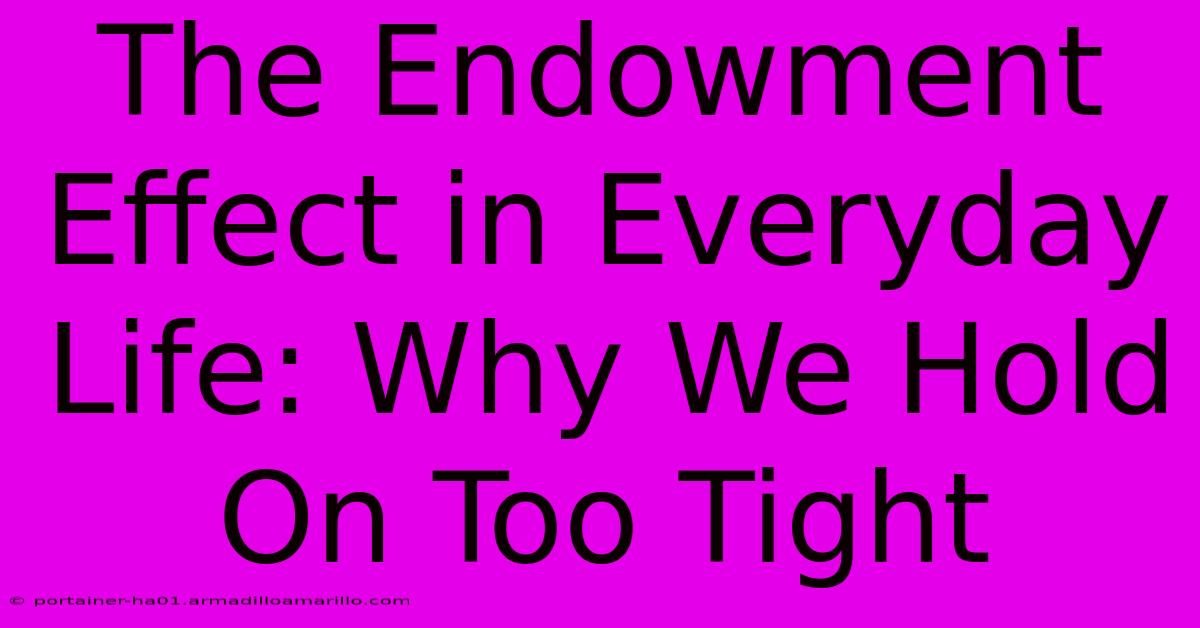The Endowment Effect In Everyday Life: Why We Hold On Too Tight

Table of Contents
The Endowment Effect in Everyday Life: Why We Hold On Too Tight
We've all been there. That slightly worn-out sweater, inherited from Grandma, that you just can't seem to part with, even though you haven't worn it in years. Or that chipped mug, a quirky souvenir from a long-forgotten trip, that holds a sentimental value far exceeding its actual worth. This is the endowment effect in action – a powerful cognitive bias that makes us value things we own more than things we don't. But understanding this bias can help us make better, more rational decisions in our daily lives.
What is the Endowment Effect?
The endowment effect, also known as the mere ownership effect, describes the psychological tendency to place a higher value on something simply because we own it. This isn't just about monetary value; it extends to experiences, possessions, and even abstract concepts. Once we possess something, we feel a sense of ownership that inflates its perceived worth in our minds. This increase in perceived value can lead to irrational decisions, such as refusing to sell something for a price higher than we would have been willing to pay for it had we not owned it.
The Psychology Behind the Grip
Several psychological factors contribute to the endowment effect:
- Loss aversion: People generally feel the pain of a loss more strongly than the pleasure of an equivalent gain. Letting go of something we own feels like a loss, making us cling to it more tightly.
- Cognitive dissonance: The idea that we made a good decision when we acquired the item influences our perception of its value. Acknowledging a lower value would create cognitive dissonance, a feeling of discomfort resulting from conflicting beliefs.
- Emotional attachment: This factor is crucial. Our personal connection to an item, shaped by memories and experiences, greatly influences its subjective value.
The Endowment Effect in Everyday Scenarios
The endowment effect isn't confined to dusty attics; it plays out subtly in various aspects of our daily lives:
1. Selling Your Belongings:</h3>
Have you ever tried to sell something online and found yourself setting a higher price than you initially expected, only to struggle to find a buyer? That's the endowment effect influencing your pricing strategy. You are unconsciously inflating the value because it's yours.
2. Negotiating a Deal:</h3>
In negotiations, the endowment effect can lead to stalemates. Both parties become attached to their initial offers, making compromise difficult. Recognizing this bias in the other party can help you navigate negotiations more effectively.
3. Holding onto Investments:</h3>
Investors often hold onto losing investments for too long, hoping for a recovery. This "sunk cost fallacy" is closely related to the endowment effect, as they're reluctant to realize the loss represented by selling.
4. Decision-Making in General:</h3>
From choosing a job to selecting a vacation destination, the endowment effect can subtly influence our preferences. Once we've made a decision, we tend to overvalue our choice, even if better alternatives exist.
Overcoming the Endowment Effect
While the endowment effect is a powerful bias, it's not insurmountable. Here's how you can minimize its influence:
- Consider your perspective: Try to imagine you don't own the item. What would you pay for it now, objectively?
- Focus on the future: Think about how you'll utilize the money gained by selling an item. This can help counter the loss aversion aspect.
- Seek outside opinions: Ask someone else to evaluate the item's value. An unbiased perspective can offer a reality check.
- Set a price and stick to it: Before selling, decide on a fair price based on market research and then adhere to it. Avoid emotional fluctuations.
Conclusion:
The endowment effect is a fascinating example of how our minds can play tricks on us. By understanding its mechanisms and implementing strategies to mitigate its influence, we can make more rational and beneficial decisions, free from the overly sentimental grip of "what's mine." Being aware of this bias is the first step toward better decision-making in various aspects of our lives.

Thank you for visiting our website wich cover about The Endowment Effect In Everyday Life: Why We Hold On Too Tight. We hope the information provided has been useful to you. Feel free to contact us if you have any questions or need further assistance. See you next time and dont miss to bookmark.
Featured Posts
-
Decoded The Spectral Symphony Of Redemption In Bible Colors
Feb 07, 2025
-
Sewing Seeds Of Doubt Sewed Or Sowed The Language Enigma
Feb 07, 2025
-
Uncover The Hidden Costs Per Day Hospitalization For Heart Attacks In Virginia
Feb 07, 2025
-
Indulge In Fontastic Delight Tt Chocolates Demibold Now At Your Fingertips
Feb 07, 2025
-
Unveiling The Secret Collation In Printing A Step By Step Guide
Feb 07, 2025
